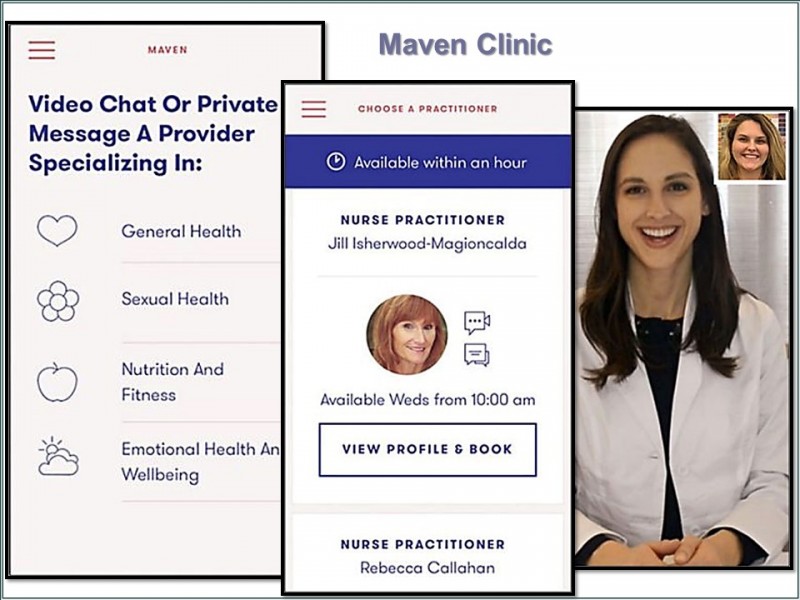As Beyonce loosely put it, we know who runs the world – girls (read: women). In the case of healthcare-related issues too, women are the ones who make most [80%] decisions for themselves and their families. Yet, the healthcare industry’s C-suite is still grossly underrepresented by women. Hence ‘women’s issues’ such as menstruation, contraception, infertility, and postpartum depression remain taboo topics, especially in the workplace context – leading to gender-based discrimination. Taking cognizance of this problem, Katherine Ryder founded Maven, a New York-based women’s online clinic, in 2014.
Ryder recounts that during the initial fundraising attempts, Maven proved to be a tough sell, especially owing to the venture capital industry being male-dominated. She found it difficult to get these investors excited about a solution for women that they just couldn’t relate to. But Ryder’s (and therefore Maven’s) luck has changed since then.
Fast forward to September 2018, when Maven successfully raised $27M in a Series B funding. This round was led by female partners at Oak HC/FT and Sequoia Capital, taking the company’s total financing to $42M. According to the terms of the deal, Sequoia’s first female investing partner in the U.S, Jess Lee, and Oak’s Nancy Brown will join Maven’s all-female board of directors.
The founder confesses, in an interview with Fortune, that Maven blossoming into a female-driven company is no coincidence. According to her, this online clinic is backed by a passionate bunch of people who truly feel for the cause. And who better to relate to women’s problems, than other women? In fact, 98% of the practitioners on the Maven network are also women.
“Health care today looks like retail did 50 years ago when you had a bunch of men talking about how best to sell pantyhose,” she told Fortune. “Maven is part of a larger trend where suddenly there are a lot of female entrepreneurs looking at women’s health—this is an enormous, highly engaged category.”
Doctor’s Appointments from your Couch
This ‘largest women’s health network in the world’ allows individuals to easily book video appointments and send private messages to a community of 1200+ vetted health service providers (across 18 specialities). Women can avail consults from the comfort and privacy of their office or home spaces with Maven. This means no more inordinately long waiting periods for expensive doctor appointments or going down the deep dark hole of Googling solutions to health problems. Appointments are almost always booked on the same day, with just a few clicks.
Charges for Facetime on the platform range from $18 for a 10-minute consult with a midwife to $90 for a 30-minute session with a psychiatric nurse, according to the brand website. Apart from providing access to OB-GYNs, doulas, paediatricians and therapists, Maven also provides sessions with career coaches who specialize in parenthood transitions.
Post consultation and assigning of a prescription, the online clinic sends the medication (be it birth control, antidepressants or UTI meds) to the patient’s local pharmacy. Additionally, users can post health-related questions on Maven’s clinic forum and have them answered by a panel of experts.
Signing up to this online health community for women is free and users need to pay only for the sessions they book. What’s more, this pay-as-you-go healthcare solution is lesser than or equal to the average insurance co-payment cost ($15 to $25).
The telehealth company also rolled out a Maven Campus, an online clinic for women on college campuses. College goers get unlimited access to same-day video appointments for $45 per month (for a month-by-month subscription)
In the midst of revolutionizing women’s healthcare, Maven tries to solve another pressing problem – that of managing patient records and thus personalizing the healthcare experience. Currently, moving health records from one provider to the next (even within one hospital) is still not a seamless process. But with Maven’s network of health care practitioners, there is always a central record of patient information that provides empanelled doctors access when the patient is referred to them.
Ryder’s Journey from VC to Entrepreneur
Sometime in 2012, when digital health was not yet a buzz-worthy subject, Ryder worked as an early-stage investor (at Index Ventures) covering this emerging sector. During this phase of her personal and professional life, she recognized a real gap in health services and products built with women in mind (especially relating to starting a family).
“A lot of my friends started having kids while I was working in venture capital, so I started hearing about the difficulties of having kids or postpartum depression,” Ryder told TechCrunch.
This brought injected a flurry of questions into her mind including why it’s so difficult to reach a doctor for something so basic as a basic urinary tract infection, and why the US has the worst maternal mortality rate in the developed world.
So, she embarked on a mission to create a ‘better healthcare user experience for women’ – Maven. And in April 2015, Maven officially launched its beta version for use by the public.
Today, Ryder (a mother of two) is at the helm of a successful brand, which recently witnessed a 300% growth (2016-17) and even named one of Fast Company‘s Most Innovative Companies of 2018.
Maven at the Workplace for Gender Equity
Even today, close to 43% of new moms drop out of the workforce within the first year after having a child. Ryder believes that part of the blame could be attributed to the lack of support from employers and corporate health plans. Not only does this cause women’s professional careers to take a beating, but it also leads to the company losing out on well-trained talent.
This puts considerable pressure on the HR departments to innovate and create a family-friendly culture, as maternity-related costs tend to be the #1 or #2 healthcare cost for companies.
In early 2016, the 15-month Maven maternity program was launched that supports employees who are pregnant and new parents. This helps bring down company costs by reducing high-risk pregnancies, C-sections, and unnecessary ER and pediatric visits. It also tries to normalize pregnancies and ease mothers back into the workforce, post their pregnancy. Through this on-demand care service, the portal claims to increase productivity and engagement, while attracting and retaining talent (especially the millennials).
Maven’s outcomes-based suite of corporate benefits is a chance for these companies to become more sensitive to the needs of its women employees. Personalized to include existing company benefits, the family benefits program enables working women to get unlimited access to the Maven network of health practitioners. They also provide access to a 24/7 health concierge that helps users navigate everything from childcare options to egg freezing discounts. The latter is especially relevant as the number of U.S. companies offering IVF benefit grew by 10% in 2017.
On its website, Maven also promises an easy rollout, of just 4-6 weeks – every HR manager’s prayer answered.
Los Angeles-based Snap Inc. adopted the Maven Maternity program and was enthusiastically met with a 95% enrollment rate and 20+ interactions between the provider and members. This scheme was reportedly such a success that Snapchat decided to add onto Maven’s fertility program, offering IVF/IUI and egg-freezing benefits. A number of other Fortune 500 companies have similarly partnered with Maven to provide their employees with these unique health services.
Invest in Women for a Brighter Corporate Future
The U.S. Telehealth market size is expected to reach $2.83B By 2022. Startups such as Nurx and Lemonaid are already working the space to provide patients with prescriptions and home-delivered pills. We also have Blink Health that gets users great discounts on home-delivered meds, while Heal is the doctor on call app. Yet, Maven is the only healthcare app for women of its kind that seeks to provide accessible wellness solutions to working and studying women.
Owing to this marked differentiation and a genuine need gap in the market, Maven has reportedly grown 14 times, in the last 12 months.
With the latest round of funding the company plans to further enhance their B2B offering for employers and health plans, thus further modernizing family planning at the workplace. It will also expand its return-to-work care products, apart of which is Maven Milk – a nationwide breast milk delivery service for new moms.
Apart from its existing bouquet of services, there is much more that Maven can do to help women shatter the glass ceiling. As Ryder said to The Lifestyle Edit, “No one has innovated in the maternity benefits space for so long – and about 1 out of 2 babies are born on corporate health plans in the US. So I think we have an incredible opportunity to really help women get the care they deserve and to help corporate America save money on healthcare costs and retain more women.”
Subscribe to our newsletter






